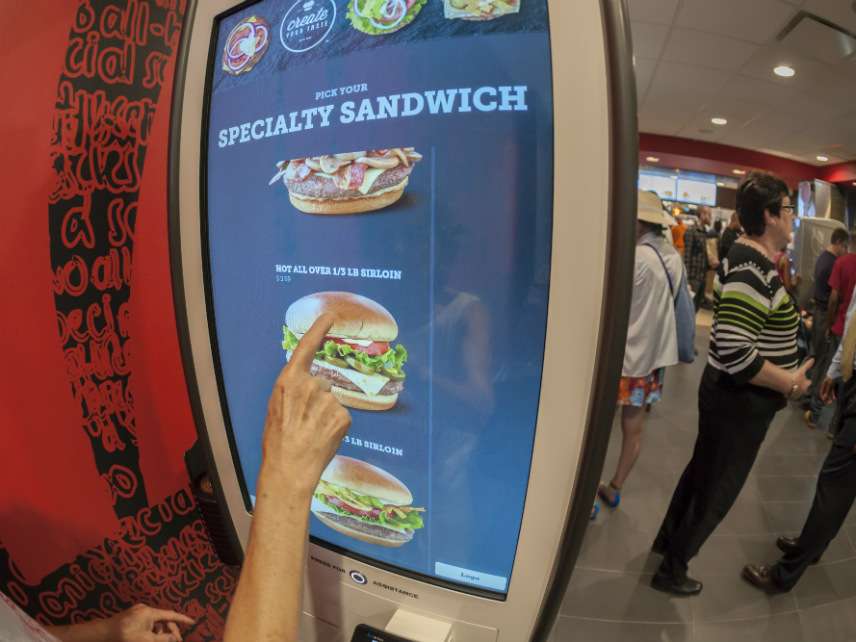Don't Blame the Minimum Wage for Those Self-Service Kiosks at McDonald's
Government-mandated price hikes do a lot of things. Spurring technological innovation is not one of them.

In their haste to condemn the negative, unemployment-inducing effects of minimum wage laws, some free-marketeers are giving these forced pay hikes undue credit for spurring technological innovation.
Witness the reaction to McDonald's CEO Steve Easterbrook's recent comments that the fast food giant would be rolling out self-serve kiosks in 1,000 stores each quarter, with the hopes of having them in all their American locations by the end of 2020. Several websites were quick to pounce on this as another example of minimum wage increases displacing the workers they are supposed to help.
"McDonald's introducing self-serve kiosks that don't need minimum wage," says the headline at Fast Company. "Workers complaining because McDonald's would not raise their wages might want to start looking for other jobs sooner rather than later," cautions Hank Berrien over at the Daily Wire.
"The Fight for $15 [campaign] has been proclaimed a success everywhere it brought about an increase in the minimum wage but, as almost anyone could have predicted, the end result is going to be more automation and, probably, fewer jobs," writes Hot Air's John Sexton, himself a former McDonald's employee.
Similar articles in Forbes and ZeroHedge have greeted past rollouts of these self-serve kiosks. Conservative Twitter is happy to reiterate the point with memes and sarcastic hashtags.
The minimum wage does indeed fuel unemployment, and these commenters' hearts are in the right place for lampooning the policy. But fingering these kiosks as an example of the minimum wage's ill effects gives the regulation undue credit for an otherwise positive development while ignoring the real costs of the policy.
For starters, McDonald's has stressed time and again that its adoption of these kiosks is less about avoiding the costs of human workers and more about capturing the benefits that come with the new technology. As company spokesperson Terri Hickey told Buzzfeed yesterday, customers appear to be more likely to place larger orders when interacting with one of these kiosks.
Hickey adds that the "restaurants are transitioning some roles to more customer engaging positions like Guest Experience Leaders and table service." James Wehner, the chain's director of global digital experience, said much the same thing to the trade publication Kiosk Marketplace last year, arguing that self-service kiosks were either having no effect on staff levels or in some cases increasing them because of the boost the machines were giving sales.
That is, of course, the sort of thing you'd expect them to say. After all, replacing workers with machines is bad PR. But marketing material from kiosk manufacturers also suggests that the main draw of these devices is not savings on labor costs.
When the kiosk maker Zivelo touts the advantages of its products, for example, it cites more accurate order-taking, easier upselling, faster ordering, and enabling companies to "redeploy the workforce to more strategic customer retention and dining room management initiatives." Notably missing is any mention of reduced labor costs.
If you're trying to discern the negative consequences of the minimum wage, you should focus less on flashy new machines and more on mundane responses, like job losses, hours cuts, and higher prices.
Seattle, one of the nation's early adopters of a $15 minimum wage, is a great example. In June 2017, the University of Washington found that the city's wage law had actually cost low-income workers $125 by reducing the number of jobs and workable hours available.
At the time I asked Mars Maynard, general manager for the Seattle bookstore Ada's Technical Books, how his business was responding. "We have changed our store hours a little bit, we have changed our staffing hours, we've reduced staffing hours, and we have raised prices," said Maynard. Automation did not come up.
When Minneapolis was preparing to raise its minimum wage a couple weeks later, Steve Minn—the owner of several affordable housing complexes in the city—told me he'd likely compensate for the new costs by reducing the frequency of janitorial service, not by buying more Roombas.
Minimum wage laws do a lot of bad things, but those new kiosks at McDonald's are not among them.
Rent Free is a weekly newsletter from Christian Britschgi on urbanism and the fight for less regulation, more housing, more property rights, and more freedom in America's cities.


Show Comments (219)